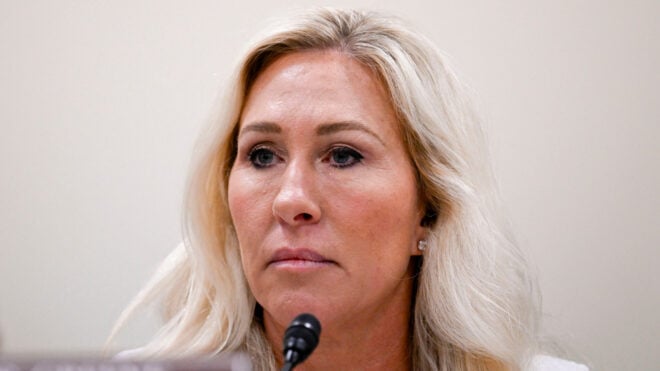
There’s a reason that movies like Clueless and Mean Girls exist, and it’s not just for the comedy. At the center of these types of movies is usually a toxic friendship that helps to move the plot forward and allows the protagonist to realize that she is better than all the mind games and manipulative behaviors and decides to turn over a new leaf.
Unfortunately, life is not a comedy starring Emma Stone or Alicia Silverstone. Growing up in the time of social media, things are not always simple and straightforward for teens and their friendships. Things can often completely change in their world overnight as someone who was once their very best friend can go to being their "frenemy" due to a misunderstanding, hurt feelings, or even just a change in the wind.
So, if you’re looking for some helpful tips on how to guide your teen through unhealthy or toxic friendships, keep reading.
Remember that your teen is their own person and it’s not a good idea to forbid them to see an individual.

Even as adults, most of us has had a friend or significant other who we later found out from our family or close friends that no one really liked or more so, no one was happy about how they treated us.
As a parent, it can feel like a difficult task to have your teen navigate their own path through any troubled or unhealthy friendships, but as long as there is no abuse taking place, it’s really best that they learn these life lessons and how to handle them on their own.

Newport Academy notes that even though it may seem like the easy fix, in the long run, it’s best for your teen’s overall development and social skills that you don’t forbid them from seeing or spending time with the friend that’s giving them trouble.
It further explains that if you want your teen to learn about what feels right to them when it comes to friends’ behaviors and how to work that out on their own, they need to learn how to “navigate difficult situations and make decisions on their own.”
Be sure to listen with an open mind and when they allow space, ask questions.

There’s certainly something to be said about being the kind of parent who has teenagers who feel vulnerable enough to come to you with their problems and like you won’t try to step in and immediately fix everything, but just listen to them.
Psychology Today explains that if your teen comes to you about a friendship that’s unhealthy or toxic, one of the best things you can do for them is to sit back and truly listen. Really allow them to get out whatever they need to because, in some sense, they may feel some of that burden or inner tension start to dissipate. It’s also important to show empathy toward your teen’s feelings rather than dismiss or downplay them because it will help them feel understood and like they're not alone.
Psychology Today also suggests that if your teen is having a difficult time verbalizing what it is they're feeling or going through, ask open-ended questions that will get them talking. You might also be able to see an angle of something that they can’t clearly see because they’re a little too close to it. So, if you can think of a way to formulate questions about their feelings in regard to something they haven’t quite made the connection to yet, so much the better.
Encourage them to reflect on their own values and beliefs and if this toxic friendship fully aligns with them.
A key thing to remember about toxic friendships, even if you’re in your teenage years and learning about what matters most to you as a person, is that you cannot control the behavior of the other person. This means it’s often about your own reaction and emotional well-being.
River Oaks Psychology explains that most of the time, in order for your teen to navigate their way through toxic friendships in a healthy way, they first need to reflect on their own values, beliefs, and personal boundaries.
It also explains that once a teenager gets a handle on how this toxic friendship may be affecting their own mental health or how this person’s behavior doesn’t align with the ways that they interact and relate to other people in their inner circle, they may start to see how this friendship does not mesh well with who they are as a person.
Talk to your teen about setting boundaries to protect their mental health and how to verbalize these boundaries to their friend.
If your teen appears to be in a vicious cycle of repetitive and negative behaviors with a specific friend, they need to know that if they want to remain friends, there has to be some discussion and asserting of their own boundaries.
HuffPost notes that some teens may decide that the best thing for them to do when their friend starts to engage in any unhealthy discourse is to simply disengage and walk away. Sometimes taking a step back and not responding to a probing text that’s just trying to get at them may teach their friend that this type of behavior is not OK and they want nothing to do with it.
The article also suggests that recommending that your teen speak directly about the behavior or dialogue that is making them feel so uncomfortable or hurt. Once they have verbalized what the problem is and how it’s making them feel, they might also feel compelled to tell them that if this continues, they will no longer feel safe in this friendship and will see themselves out of it.
If your teen feels like this friendship has run its course, allow them the time and tools to grieve and move on.

If your teen has a friendship in their life that has turned course and is full of jealousy, ridicule, and distrust, sometimes, no matter how many conversations they try to have with the person, things aren’t going to change anytime soon and the friendship may have to end.
Kids Help Phone notes that losing a close friend, especially as a teenager, can cause a lot of hurt and pain. There might also be some feelings of resentment toward the friend if your teen was the one continually trying to work on and better the situation. It may feel like a failure to them, even if they can’t quite put a name to it.
More from LittleThings: 7 Productive And Educational Ways To Keep Your Teen Busy This Summer
Your teen may need some time to work through their feelings and grieve this friendship, especially if they’ve been in each other’s lives for a long time. As a parent, all you can do is be supportive when they need to talk and gently push them to try and put more positive energy and time into some of their other friendships.
Support your teen’s inner emotional life as much as you can in order to create a safe space with healthy communication.
Throughout their teenage years and into adulthood, your kid is likely going to come across many relationships and friendships that are unhealthy for them. Besides showing them an empathetic ear and comforting shoulder to cry on, one of the only things you can do as the parent of a teenager who is going through transitional phases is to make sure their home life is as safe and nurturing as possible.
PureWow explains that since so much of parenting is focused on “the external” — what your child’s health, well-being, and school life look like, there is another facet to parenting that involves your teen’s “inner world,” which is just as important.
A teen’s inner world can often involve struggling with depression or anxiety, but if you’re attuned and open to what they’re experiencing, especially in terms of their interpersonal relationships, they’re more likely to come to you when these emotions and difficult times pop up.




